“By the Grace of God” (“Grâce à Dieu”) (2018 production, 2019 release). Cast: Melvil Poupaud, Denis Ménochet, Swann Arlaud, Eric Caravaca, François Marthouret, Bernard Verley, Martine Erhel, Hélène Vincent, François Chattot, Frédéric Pierrot, Aurélia Petit, Julie Duclos, Jeanne Rosa, Amélie Daure, Nicolas Bridet, Pierre Lottin, Stéphane Brel, Martine Schambacher, Max Libert, Nicolas Bauwen, Laurence Roy, Jacques Lagarde, Davan Collin, Jules Gauzelin, Noah Richard. Director: François Ozon. Screenplay: François Ozon. Web site. Trailer.
Working up the necessary courage to conquer fears that we believe cannot be vanquished can be one of the most difficult and terrifying challenges we can undertake. The effect can be paralyzing, leaving us stuck in a hellish limbo that feels like it has no end. But, with the right perspective, that need not be the case as a group of victimized individuals discover for themselves in the new fact-based French drama, “By the Grace of God” (“Grâce à Dieu”).
Middle-aged family man Alexandre Guérin (Melvil Poupaud) appears to lead a happy life with his wife, Marie (Aurélia Petit), and his five children in Lyon, France. But lurking beneath the veneer of happiness lies a dark secret that he has rarely revealed – that he was sexually abused by a priest, Fr. Bernard Preynat (Bernard Verley), while growing up. The series of indiscretions occurred primarily while Alexandre was at a church-sponsored scout camp in Ireland at which Fr. Preynat served as counselor – and resident predator. It’s something that has haunted Alexandre ever since.
[caption id="attachment_11122" align="aligncenter" width="350"]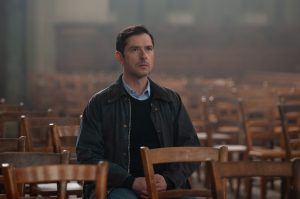 Middle-aged husband and father Alexandre Guérin (Melvil Poupaud) struggles with his memories of childhood abuse at the hands of a priest in the new fact-based drama, “By the Grace of God” (“Grâce à Dieu”). Photo courtesy of Music Box Films.[/caption]
Middle-aged husband and father Alexandre Guérin (Melvil Poupaud) struggles with his memories of childhood abuse at the hands of a priest in the new fact-based drama, “By the Grace of God” (“Grâce à Dieu”). Photo courtesy of Music Box Films.[/caption]
When Alexandre learns that his aging abuser has escaped prosecution in the time since then – and that Fr. Preynat has always been transferred to a new parish whenever issues arose – he’s appalled, especially when he hears that the troubled priest has been reassigned yet again to a new venue in which he’s charged with teaching Bible study classes to young children. He decides to take action by speaking up and calling out the abuses to the head of the diocese, Cardinal Barbarin (François Marthouret), hoping that it will lead to some kind of action. He gives a detailed, explicit statement to the Cardinal’s aide, Régine Mayor (Martine Erhel), who arranges an intervention between Alexandre and Preynat. At that meeting, the victim confronts his perpetrator, who freely admits his acts but who refuses to apologize.
Needless to say, Alexandre is left disappointed. Upset at the outcome, he arranges to meet the Cardinal in person. He sympathizes with Alexandre’s plight, but he refuses to take any action that might damage the church’s reputation with the public, a decision that further outrages the aggrieved victim. Alexandre thus decides to take matters into his own hands, a plan that he hopes will result in prosecution.
In launching this effort, however, Alexandre learns that he, like many other of Preynat’s victims, is unable to bring suit, because the 20-year statute of limitations has run on whatever potential claim he might try to make. If he’s to get any meaningful results, he needs to identify others who are still eligible to legitimately file a claim.
Alexandre begins his quest by networking with others, starting with his friend Olivier (Nicolas Bridet), who was also abused. Through connections developed by the two of them, they find others who were also victimized by Fr. Preynat, most notably Gilles Perrot (Eric Caravaca) and François Debord (Denis Ménochet), who take the lead in establishing a formal victims’ network on the Internet. This, in turn, brings them into contact with Emmanuel Thomassin (Swann Arlaud), a victim whose statute of limitations has not yet expired. At Last, Alexandre, Gilles and François have found someone who can bring a valid and timely case.
[caption id="attachment_11123" align="aligncenter" width="350"]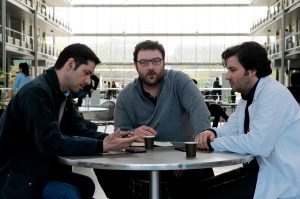 Childhood sexual abuse victims Alexandre Guérin (Melvil Poupaud, left), François Debord (Denis Ménochet, center) and Gilles Perrot (Eric Caravaca, right) organize an Internet-based victims’ network to connect others affected in “By the Grace of God” (“Grâce à Dieu”). Photo courtesy of Music Box Films.[/caption]
Childhood sexual abuse victims Alexandre Guérin (Melvil Poupaud, left), François Debord (Denis Ménochet, center) and Gilles Perrot (Eric Caravaca, right) organize an Internet-based victims’ network to connect others affected in “By the Grace of God” (“Grâce à Dieu”). Photo courtesy of Music Box Films.[/caption]
Emmanuel is troubled by his experience, it having left him saddled with a variety of personal problems, both physical and psychological. However, he summons up the courage to make a statement to the police, an investigation led by Capt. Cousteau (Frédéric Pierrot), who aggressively seeks to prosecute. Justice, it seems, may at last be on the way.
Of course, Preynat is not the only one on the hook. When word begins to circulate that his superiors knew what was going on and took no action – despite Preynat’s pleas for help to them about his problem – suddenly the church hierarchy gets put under the microscope. And, as the victims’ network turns up the heat, what began as one man’s search for justice turns into a full-blown public scandal, with considerable consequences on the line.
The issue of predatory priests has affected Roman Catholic dioceses around the globe, and the fallout has been extensive, especially in light of the church’s delayed and inadequate responses to the problem. It has become the subject of widespread media coverage, and the story has made its way into a number of films, such as this one, as well as the Academy Award winner for best picture, “Spotlight” (2015). It’s a story that has shaken the faith and trust that many have long placed in this centuries-old religious institution. However, the human cost of this travesty has not surfaced in detail as much as it has through this picture, bringing the question down to a more personal scale than perhaps any of the other treatment of this subject thus far.
Many of the personal considerations that this film raises concern basic issues of how individuals in their developmental years relate to the world around them. In this crucially formative age, they learn the ways of the world and form beliefs about how it works and what their role in it should be. These beliefs are critical, for they shape their holders’ views of reality and how it unfolds, especially where matters involving their relationships to authority figures are concerned. They learn about concepts like obedience and conformity and what it takes to comply with them, based on what people they come to trust tell them to do – even if what they’re told is not in their best interests.
This is important because what transpires helps to set their belief patterns for living, for the manifestation of their existence, the core principle underlying the conscious creation process, the philosophy that maintains we draw upon these metaphysical building blocks in the materialization of our world. And, given the fact that they have been intentionally led to believe that the heinous acts inflicted upon them are perfectly acceptable by those they’ve been taught to trust implicitly, the deception they’ve been falsely guided into embracing makes the crimes that much more odious.
For the victims who were so horribly misled, this abomination has created a number of problems. To begin with, it has caused them to accept beliefs in the validity of the abhorrent acts perpetrated against them. In turn, that has led them to embrace a belief formation process – and, subsequently, a view of reality and its creation – that’s far from healthy. And, once they discover what’s been allowed to transpire, they’re left confused, disillusioned, betrayed and damaged in countless ways, affecting them psychologically, emotionally, and, in some cases, physically.
[caption id="attachment_11124" align="aligncenter" width="350"]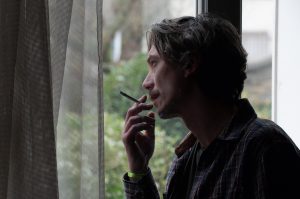 Emmanuel Thomassin (Swann Arlaud), a childhood sexual abuse victim still eligible to file suit against his perpetrator, contemplates how to proceed in director François Ozon’s “By the Grace of God” (“Grâce à Dieu”). Photo courtesy of Music Box Films.[/caption]
Emmanuel Thomassin (Swann Arlaud), a childhood sexual abuse victim still eligible to file suit against his perpetrator, contemplates how to proceed in director François Ozon’s “By the Grace of God” (“Grâce à Dieu”). Photo courtesy of Music Box Films.[/caption]
For many of the victims, once they learned these painful truths, they were stricken in fear. They were unable to come forward for various reasons. Some were ashamed of their behavior and were reluctant to admit it, even though they did not initiate it. Others were afraid to speak up for fear of the implications that could come for calling out authority figures, particularly authority figures who they had been taught to trust. And still others feared the power of an institution that they believed could come down on them for becoming whistleblowers, with ramifications that included everything from ridicule to perhaps even the fate of their eternal souls.
To rectify this situation, however, the victims had to learn how to overcome these fears, to be willing to step up and call out those who abused them. This meant rewriting their beliefs about their fears and replacing them with courage-based notions that would give them the strength and conviction to do what it would take to speak their minds and publicly identify the perpetrators, as well as their enablers and collaborators.
This was not easy, to be sure. Through flashbacks involving their younger selves (Davan Collin, Jules Gauzelin, Noah Richard), Alexandre, François and Emmanuel relive what happened to them, this time with a new awareness of what took place in light of their new beliefs. In addition to bolstering themselves in the face of these heightened apprehensions, the victims also had to muster the courage needed to face the blowback that would come from their actions, particularly in such a staunchly Catholic nation as France, where the institution has long enjoyed virtually unflinchingly blind public support. The challenge in that, obviously, was considerable.
What’s more, the victims not only faced opposition from the church, but also from sources closer to home. Immediate family members, such as Alexandre’s parents (Laurence Roy, Jacques Lagarde) and François’s parents (Hélène Vincent, François Chattot), were unsupportive – sometimes even critical – of their sons’ activism. At the time of the abuse, their parents were generally indifferent or unwilling to do anything, even when they had their own suspicions, either because they didn’t want to make waves or out of fear of what the church might do to them. And, when their sons spoke up as adults, their support was lacking or tepid; Alexandre’s parents encouraged him to let go of what happened all those years ago, hoping that the situation would just go away; and François’s parents, though upset at what transpired and embarrassed by their lack of past oversight, were noticeably uncomfortable with everything coming to the surface and in the bright light of day.
[caption id="attachment_11125" align="aligncenter" width="350"]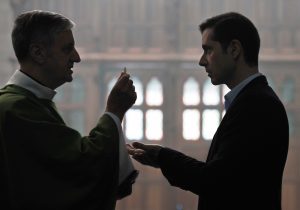 Sexual abuse survivor Alexandre Guérin (Melvil Poupaud, right) confronts his abuser, Fr. Bernard Preynat (Bernard Verley, left), in “By the Grace of God” (“Grâce à Dieu”). Photo courtesy of Music Box Films.[/caption]
Sexual abuse survivor Alexandre Guérin (Melvil Poupaud, right) confronts his abuser, Fr. Bernard Preynat (Bernard Verley, left), in “By the Grace of God” (“Grâce à Dieu”). Photo courtesy of Music Box Films.[/caption]
And then there was the difficulty involved in coping with side effects that grew out of the abuse. Some of those who contacted the support network through its hotline were noticeably shaken by their experiences, admitting to all manner of issues from emotional upset to suicide attempts. Among the principals in this story, Emmanuel was most affected, suffering from emotional fallout that caused him difficulty in developing and sustaining romantic relationships, as well as physical troubles including seizures and Peyronie’s disease. For most individuals, these conditions would be challenging enough to contend with in and of themselves, but, when added to the issues here, it made the lives of the affected that much more burdensome.
To add insult to injury, the victims also had to deal with the inadequate action of the church. Based on how the diocese handled Fr. Preynat’s indiscretions, coupled with statements by the Cardinal, it was apparent that the ministerial powers-that-be just didn’t get what was going on, unable to recognize the severity of the problem and unaware of what needed to be done. Fr. Preynat’s own pleas for help going unanswered by the church speaks volumes. But, even more egregiously, when the Cardinal observed that the church was “thankfully” spared even greater liability – a result of the tolling of the statute of limitations in many cases – by the grace of God, he was roundly criticized for his ignorance and indifference, something he explained away as a poor choice of words. Clearly he failed to recognize the gravity of the situation, believing his institution to be above such menial secular matters. Beliefs like that can truly get one in trouble.
Fortunately, the victims managed to successfully put all of the foregoing considerations aside, casting off their fears, taking back their personal power and invoking the courage needed to address the problems that had gone long unattended. They mustered up the fortitude to foster change that not only benefitted many of their own, but that also led to new protections to safeguard against potential future incidents. In conscious creation terms, that’s a prime example of living out one’s value fulfillment, the notion associated with being one’s best, truest self for the betterment of oneself and the world at large. And, if that’s not the grace of God (or the Universe or whatever term best suits you), I don’t know what is.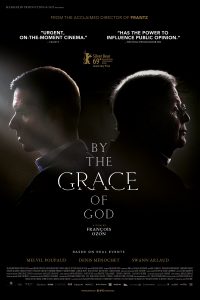
While the film sensitively deals with serious subject matter and becomes steadily more compelling as the narrative plays out, the story overall is sometimes a little too “tame” in addressing its material. What’s more, even though the picture aims to address the personal impact of this story on its principals more so than other such films have, it sometimes becomes bogged down by extraneous anecdotal material that adds little in the way of meaningful content, either in the individuals’ experiences or the larger scenario of which they’re a part. It’s easy to gets the impression that the film’s heart is in the right place but that it isn’t willing to go for the jugular more than it probably should have, perhaps a shortcoming of a French production taking on the French Catholic Church. Although the institution in question may wield considerable power, that doesn’t immunize it against justified scrutiny and criticism, no matter how much good work it may do. Director François Ozon’s offering gives a voice to those who traditionally have not had one, but it simultaneously misses the chance to sufficiently take on an organization that could have – and should have – done more than it did to keep an atrocity from getting out of hand.
“By the Grace of God” recently completed a limited theatrical run and is currently no longer in moviehouses. However, DVD and streaming releases are in the works, with details to follow.
Surviving ordeals like those suffered by the characters in this film may seem impossible at the time we’re going through them. However, by looking within to discover the reserves of strength that reside within us, we can begin the process of liberating this resource and putting it to use for ourselves and others like us. And the miracles its release can work are often truly astounding, bringing much-needed relief, justice and rectification. That’s quite a feat, but then there’s no telling what we can accomplish when we combine our considerable capabilities with those of the grace of God.
Copyright © 2019, by Brent Marchant. All rights reserved.
Sunday, December 8, 2019
‘Grace of God’ examines the struggle to liberate trapped courage
Subscribe to:
Post Comments (Atom)

No comments:
Post a Comment